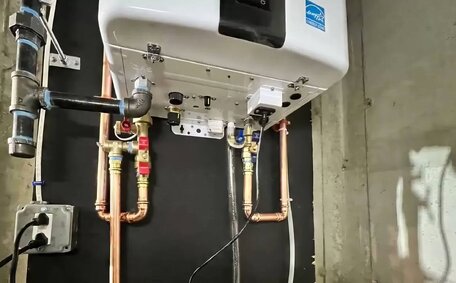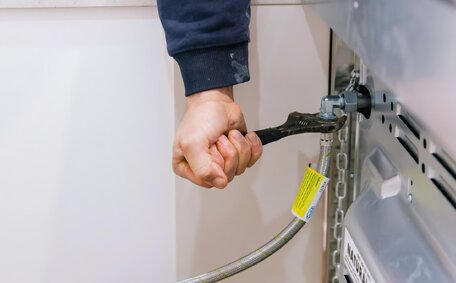Introduction to Common Plumbing Materials
When building or renovating a home, choosing the best plumbing pipe types is crucial for ensuring an efficient and long-lasting system. Residential plumbing commonly uses various pipe types, including:
- Copper - Known for its durability and resistance to corrosion, Copper is suited for water supply lines thanks to its corrosion resistance and strength. However, due to its rigidity, copper is more challenging to install.
- PVC/CPVC - PVC and CPVC are favoured for their straightforward installation and suitability for both hot and cold water delivery. But when choosing them, remember they can become brittle over time.
- PEX - Flexible PEX plumbing pipes facilitate installation, particularly in constrained spaces, and provide a durable solution against temperature extremes.
- Cast Iron - While cast iron is excellent for waste drainage due to its resilience, lighter plastic alternatives are increasingly preferred.
The soil, your water supply and intended water temperature should be factors to consider when guiding your choice of pipe material. Consulting a professional plumber can make your selection optimal for your plumbing system.
Understanding Your Home’s Plumbing Needs
In a bathroom renovation, an assessment of water pressure, pipe layout, water quality, and temperature requirements is essential to choosing appropriate plumbing materials.
Hard water areas benefit from scale-resistant pipes such as copper or PEX, the latter also offering flexibility for easy installation around bends. CPVC and PVC are highly corrosion-resistant but unsuitable for extreme temperature applications, such as water heater lines. Material selection also impacts durability; for instance, properly installed copper pipes may last over half a century.
Ideally, Consult an experienced Minchinbury plumber to make sure they evaluate what types pipes can best suit your home’s unique specifications. They can assist in identifying plumbing materials that are compliant, durable, and tailored to efficacy, safety, and environmental considerations.
Key Factors When Selecting Plumbing Materials
When it comes to selecting plumbing materials, some key factors to consider include:
- Temperature resistance - Select materials like PEX that endure both hot and cold water without warping, sustaining temperatures up to approximately 93°C.
- Water type - Hard water causes scale buildup so materials like copper that resist corrosion are preferable. PVC and CPVC piping are more prone to damage your plumbing system from hard water minerals over time, whereas copper can resist such damage.
- Pressure handling - Pipes must withstand water pressure surges. A pipe your system might utilise, like copper, is suitable for pressures exceeding 125 PSI.
- Ease of installation - Flexible tubing like PEX simplifies installations as it can manoeuvre around corners easily. PVC and CPVC are also DIY-friendly.
- Code compliance - Ensure chosen materials adhere to Australian plumbing standards for application type, size, plumbing fittings requirements etc.
Considering key factors facilitates the selection of safe, efficient, and durable pipe materials for your plumbing system. Consult a qualified Minchinbury plumber to know which pipes best serve your needs that balance functionality, cost, and longevity.
Plastic Pipe Options
Plastic piping, especially options like PEX, PVC, and CPVC, are now more durable and reliable compared to traditional metal pipes, thanks to recent advancements. PEX pipes offer cost efficiency, lighter weight, and ease of installation, outperforming traditional materials such as galvanised steel or cast iron.
Key considerations for efficient plumbing supplies are:
- Corrosion resistance - Plastics like PVC and CPVC are inert, due their composition, making them a frequent choice as they won’t rust or degrade over time.
- Cost savings - Opting for plastic pipes can save significantly when compared with metal varieties.
- Ease of installation - The lightweight nature of plastic and its flexibility simplify both DIY and professional installations.
- Acoustic dampening - Plastic pipes are effective in reducing the noise from water hammer and supply lines.
PVC and CPVC, types of pipe commonly integrated when you need new piping, are suitable for hot and cold potable water delivery. CPVC is also suitable for tankless water heating systems with water temperatures up to 200°F continuously. Flexible PEX tubing resists freeze damage better than copper and is useful to install in your plumbing system with flexibility when navigating tight spaces.
The sustainability and low maintenance needs of choose right plumbing with plastic piping make it a smart, modern choice. Consult a qualified plumber to ensure you select the right types plumbing pipes for your water systems to meet local standards.
PVC Pipes
Polyvinyl chloride (PVC), known for its robustness, is widely chosen for wastewater and stormwater systems. PVC used in water lines can withstand exposure to chemicals and corrosion, which makes it an optimal material for sewers and downspouts.
Advantages of PVC pipes include:
- Durability - PVC is resistant to abrasion and chemical corrosion, offering a lifespan of over 50 years.
- Cost-effectiveness - PVC pipes are more affordable than metal options such as cast iron or galvanised steel.
- Easy installation - Lightweight PVCcomponents simplify handling and connections.
- Noise reduction PVC effectively dampens the sounds from your drains and drainage system.
However, use PVC for cold water in domestic plumbing to avoid warping and the health risks associated with chemical leaching at high temperatures. PVC can also be kept away from sources of ignition as it’s flammable.
Overall, PVC, usually used in residential homes, makes an economical, low maintenance drainage piping choice. Consult Minchinbury plumbers to correctly install PVC according to local residential plumbing codes and standards.
PEX Piping
PEX, or cross-linked polyethylene, stands out as a flexible and versatile choice for domestic water supply lines. PEX pipe is flexible plastic tubing that is highly durable and easy to install around corners or in tight spaces.
Key advantages of PEX include:
- Withstands extreme hot and cold temperatures from freezing point up to 200°F.
- Resists scale build-up and corrosion from water contaminants.
- Doesn’t burst easily like copper and handles water pressure fluctuations.
- Simplifies installations as it’s up to 10x more flexible than rigid pipes.
While PEX is useful for hot and cold supply lines, it’s also not suited for direct connection to water heaters or boilers - a metal connector is required. PEX also isn’t suitable for exposure to UV light, gas water lines or other gas transport applications.
Overall, PEX offers a versatile and reliable piping solution, helping you to know your options when selecting a material for potable water delivery in residential settings. Consult a qualified Minchinbury plumber to appropriately integrate quality PEX tubing into your home’s plumbing system.
Metal Pipe Alternatives
Galvanized steel piping, often seen in older homes and historically one of the most used for water supply lines, remains one of the most durable materials in plumbing systems. Copper and galvanised steel were once leading choices for supply pipes. While brass piping is very durable, metal pipes like copper can be tricky to install, expensive, and are less commonly used in plumbing settings than plastic alternatives due to their thermal conductivity.
Today, in both residential commercial settings, two primary types of metal plumbing pipes are still commonplace due to their resilience:
- Copper - Offers excellent corrosion resistance but struggles with hard, mineral-rich water over time.
- Stainless Steel - Though costlier than copper, stainless steel offers superior lifespan and is low-maintenance.
We’ll delve into the pros cons of copper and stainless steel piping to help determine the best metal alternative for your home’s plumbing needs.
Copper Pipes
Copper pipes are one of the best your home can have, being common and versatile types used for water supply lines in Australian homes. commonly used for their durability, copper water pipes can last over 50 years when properly installed.
Key benefits when you choose the right copper pipes for your house include:
- Withstand corrosion and scale build-up better than plastic pipes
- Can handle water pressures exceeding 125 PSI without bursting
- Suitable for the entire hot cold water supply
- Antimicrobial properties reduce bacteria growth
- There’s Copper pipes do not pose a risk of chemical leaching
However, Copper piping performs poorly in acidic water or soils with high mineral content over long periods. The rigid piping, typically used for water lines, is also difficult to install around tight corners.
Overall, copper strikes the best balance between longevity, performance and cost for residential water supply lines. Consult qualified Minchinbury plumbers to integrate the pipes best suited for quality copper into your home’s plumbing system.
Stainless Steel Piping
Stainless steel piping stands out for impressive corrosion resistance and longevity, lasting over 50 years. More expensive upfront than copper pipes, stainless steel offers superior maintenance-free performance and is easier to clean from scale build-up.
Key advantages of stainless steel pipes:
- Withstand constant hot water flow up to 250°F
- Resist corrosion and mineral deposits from hard water
- Low-leach lead-free construction per plumbing codes
- Lower flow resistance than copper decreases water hammer
- Suitable for supply lines, drainage and high-pressure applications
A smooth interior surface reduces the frequency of replacements necessitated by bacterial growth. Stainless steel requires specialised fittings and joints for secure connections, reflective of its high-grade manufacturing.
For supply line replacements or critical projects, stainless steel piping integrated with the right plumbing fixtures provides unparalleled safety and reliability. Consult a Minchinbury plumber to determine if the extra cost is warranted for your application.
Installation and Maintenance Considerations
When selecting plumbing materials, consider installation complexity, tool requirements, and long-term maintenance.
Plastic pipes like PVC and CPVC are among the different types of pipes that are easiest to install yourself in DIY installation. Flexible PEX tubing, the right type for bending around obstacles, also simplifies bathroom plumbing installations during professional or homeowner projects. Copper and stainless steel require more skill and specialty tools to cut, join and fit correctly.
While all pipes require maintenance, PVC and PEX often need less attention and are less prone to issues such as low water pressure compared to metal pipes. However, plastic may need full replacement sooner under low water quality conditions than properly installed steel pipe or copper which can last over 50 years.
To extend the life of steel, cast iron, or any plumbing material, consider these measures:
- Carefully follow manufacturer instructions for correct installation to ensure reliability in the long run.
- Inspect regularly for pinhole leaks and address immediately to avoid larger failures and prevent situations where you could end up with extensive damage.
- Plan for periodic replacement of highly-utilized pipes with modern, dependable materials.
When it comes to choosing the best pipe plumbing materials for your new installation, the goal is to reduce initial setup costs. However, considering long-term maintenance against the selection of durable plumbing pipes can be more economical over time. Consult qualified Minchinbury plumbers to determine the most practical, long-lasting plumbing system materials for your home’s needs.
Complying with Local Plumbing Codes
It’s crucial to comply with the relevant plumbing codes and standards when installing or replacing pipes in your Minchinbury home.
The Australian Plumbing Code mandates regulations that encompass:
- Approved materials for commonly used plumbing fittings and fixtures
- Pipe sizing based on intended application
- Installation methods by authorised professionals including the integration of proper pipe fittings
- Regular inspections and maintenance to uphold safety
Sydney Water Corporation enforces backflow prevention standards, safeguarding drinking water from contamination.
Failing to adhere to local plumbing codes can risk:
- Plumbing system failures that can cause substantial property damage
- Health hazards from water contamination
- Fines for non-compliant plumbing
To ensure full compliance with Sydney and Minchinbury plumbing regulations when it comes to proper installation, consult qualified, licenced professionals like Minchinbury Plumbing. Their expertise will ensure you select approved, quality materials installed per code to provide reliable, safe plumbing operation.






